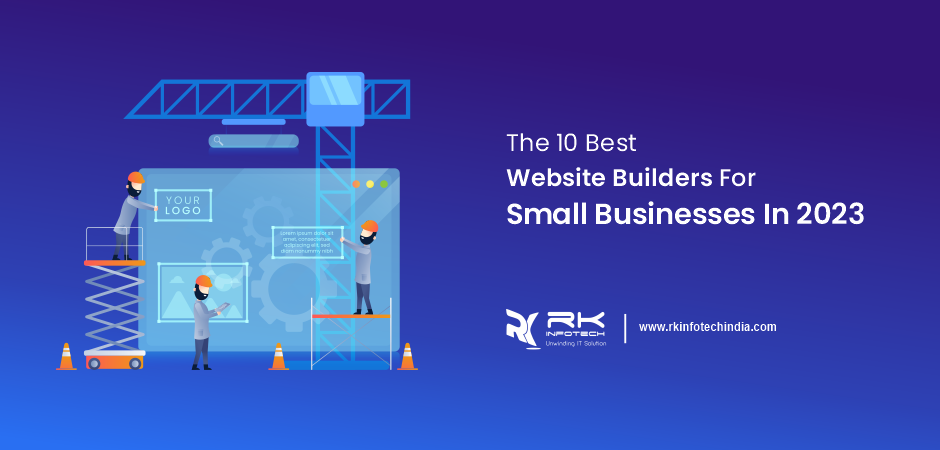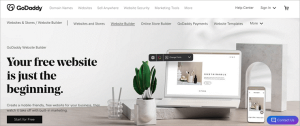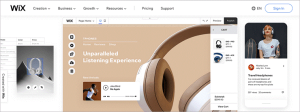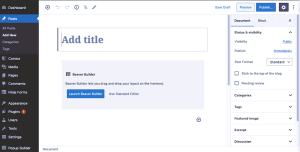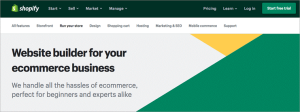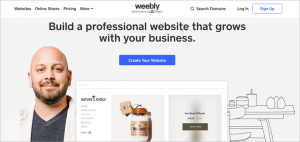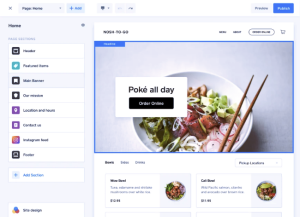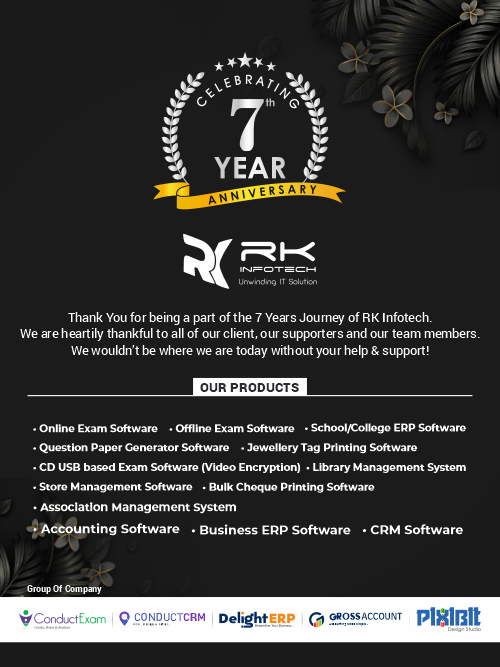The 10 best website builders for small businesses in 2023
Introduction
With Website Builder, it’s easier than ever to create your own website without any coding knowledge. There are also website builders designed for specific purposes such as online stores and blogs. The best website builders are easy to use, affordable, and leave room for growth.
Our most popular options include templates or themes so you can start designing. This makes adding your images or content much easier and publishing quickly. Most of the website builders on our list are all-in-one solutions that include web hosting, domain registration, and an integrated editor.
To choose the best website builder, we analyzed dozens of options based on cost, ease of use, features, storage and bandwidth, user reviews, and more. We hope our guide helps you find the best option for your unique needs and budget.
What is a Website Builder?
The popularity of web designers has skyrocketed in the past decade. But what are website builders? Website Builder is a DIY tool that allows users to create websites using pre-made templates without any design or coding.
The website builder offers a variety of design templates to choose from. The website builder you choose will determine how your site looks and functions, what features you can enable, and many small details like SEO and transaction fees that will help or limit your success. However, each business has different needs and there are many website builders for small businesses. Need a custom site with lots of features? Or do you want something quick and easy that was yesterday? This is where this guide comes in handy.
10 best website builders for small businesses in 2023
1. GoDaddy
A recognizable name in the internet services industry since the late 90s. Since then, GoDaddy has expanded its hosting and domain offerings to include small business website builders. Based on the same templates as Constant Contact, users can create automatic site templates based on their industry and customize specific content to their liking.
However, while it’s a step up in terms of what you can customize by offering additional options like colors and fonts, it’s a step down in terms of free features.
Advantages:
- It offers slightly more customization than another fast website.
- User-friendly interface, friendly to beginners Website editor can be used on mobile devices.
Disadvantage:
- SEO is not “optimal”.
- Negative reviews reveal deeper problems with GoDaddy
- If you are interested in SEO, social media, and email marketing, you should buy a premium plan.
Recommended for:
- People who need a simple website So, it’s best for websites, marketing, and payments.
2. Strikingly
Surprisingly, it only specializes in one-page websites. This is a niche website builder that is not for everyone. However, it has a well-established support team and in-depth editors, making it an excellent choice for personalizing a simple website. The templates are very modern and versatile, so you can easily choose the style you like and add your content for a personalized experience.
However, while offering more design options than its competitors, it is fairly meager in features. If you need more than a landing page or brief description, we won’t help.
Advantages:
- The in-depth editor offers more customization options than other fast websites.
- Excellent 24/7 customer service (or”executive happy”).
- The interface is simple enough that beginners can figure it out quickly.
Recommended for:
- A fast website builder for single-page sites like landing pages or quick descriptions.
- Best for building great mobile websites for free.
3. Wix
Wix is an internet site builder with customizable designer-made templates. It gives all of the functions and functionalities required for creating, designing, and coping with websites and may be used for a blog, store, business, etc. Wix is a drag-and-drop internet site builder. It gives bendy pricing plans along with plans for expert sites, accepting online payments, and custom solutions.
Advantages:
- Ideal internet site editor is each clean to apply with a “drag and drop” interface and large on customization.
- AI generation, template-fashion, or layout from scratch — whichever you prefer beneficent
- unfastened plan (with Wix branded ads) all-inclusive package deal consists of a web website hosting and SSL thrilling layout alternatives like lively effects limitless pages and loads of templates
- search engine optimization and advertising tools
Disadvantages:
- Can`t alternate your template — remodeling with a brand new template includes rebuilding from scratch
- Mild gaining knowledge of curve have to improve to a paid account to put off advertising
- No `Live Chat` option
Recommended for:
- Those who need to lay out their internet site, but want a little guidance
- People with internet layout to enjoy
- Who needs an easy editor Thus Best for a whole lot of templates, limitless pages, and top-grade web website hosting
4. Squarespace
Think of Squarespace as a near opportunity to Wix, each goal that area of interest of bendy customization alternatives with an easy-to-use editor. The distinction among them, though, is small but clear: Squarespace`s editor isn’t pretty as user-pleasant as Wix`s.
However, the designs are barely greater polished for higher visuals. That makes Squarespace only a hair in addition to the proper of the convenience-customization spectrum.
Advantages:
- Amazing stability among layout alternatives and ease-of-use
- Greater designated onboarding manner facilitates beginning you off
- Amazing visuals and well-designed templates
- All templates are cell responsive
- Can upload coding with the Premium plan
- Cell editor
- 24/7 client support
Disadvantages:
- Steeper mastering curve than Wix
- No accessories or app store, so you`re caught with innate feature
Recommended for:
Like Wix, Squarespace is for all of us who desire to layout a website with the assistance of a few education wheels and are inclined to spend greater time on the layout for a higher-searching site. Thus best for an all-in-one answer for growing a lovely website.
5. WordPress
Although WordPress enjoyed a long run as the top website builder throughout the early 2010s, the emergence of more user-friendly editors like Wix and Squarespace has humbled it somewhat. Still, it remains relevant and competitive with some unique features and a host of customization options thanks to its nigh-limitless plugin library, and its supreme blog-friendliness.
Advantages:
- countless features, themes, and customization options thanks to the robust 3P community of plugins
- that community offers tons of support and feedback if you need technical assistance
- best website builder for blogs, especially considering the option to use extra SEO plugins like Yoast
Disadvantages:
- large learning curve and at-times frustrating usability—WordPress takes a big time commitment
- All the best features (via plugins) cost extra
Recommended for:
- Best for hosting and unlimited plugins. It is a flexible website builder.
- more experienced website managers, especially those with prior experience in WordPress
- businesses whose content and SEO strategies depend heavily on blogs
- designers who want the utmost customization at the cost of time
6. Shopify
Shopify is a fast and simple e-commerce website builder. If you choose a theme, there’s little to no design and customization, good or bad. Shopify is made for people who want to focus more on their business than building a website. It offers all the features retailers need, such as upsell opportunities and promotional opportunities, but design options are kept to a minimum. The templates look nice enough, but if you want a creative or unique-looking website, Shopify is not for you.
Advantages:
- Lightning-quick setup (although it takes longer if you have a lot of products)
- Most user-friendly of the e-commerce website builders
- All the sales features you need, some built-in and the rest available via add-ons
- Great for social media integration
- All-inclusive package includes hosting
- 24/7 phone support
- High customer satisfaction scores
Disadvantages:
- Limited design options and templates (not ideal for customization)
- There’s a high risk of your site looking like other Shopify sites with the same template
- It can be pricey, especially if you use a 3P payment gateway
Recommended for:
- serious retailers who want to focus on sales instead of design
- amateur or new sellers who want to get their wet feet in e-commerce
- Best for building and managing an online store.
7. Duda
Duda offers a more sophisticated template-style website builder, but none less still boilerplate. It fills a niche of people who want some customization but don’t want to do any design work. It offers several useful features that other basic website builders do not, such as special displays for new visitors or location-specific features (e.g.phone number display). It also has an extensive library of templates and the ability to create custom routes. In general, Duda is a solid middle ground between convenience and customization.
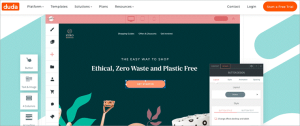
Advantages:
- Over 90 templates, most designed well
- Unique features like conditional displays
- More thorough customization options (compared to the other “fast” builders)
- App store for extra features
Disadvantages:
- More complex site editor means more time spent building
- Stifling native SEO; you’ll need to research and add SEO techniques yourself
Recommended for:
- People who want a fast-and-easy site builder, but aren’t satisfied with the bare-bone design options of their competitors
- beginner website managers who want to dabble in design
Best for a flexible solution with an intuitive editor. It is a feature-rich platform and supports low-code or no-code creation of websites.
8. Weebly
Weebly is more complex than Shopify, but not as complex as BigCommerce. This is a typical e-commerce website builder. This isn’t specific to e-commerce, but it seems to be primarily aimed at e-commerce users, so we thought it might be a better fit here. Weebly offers more design options than the average basic website builder, but not enough to be overwhelming.
Advantages:
- thorough onboarding is a great help for first-timers
- easy-to-use “drag and drop” interface
- most templates are mobile responsive
- inclusive package includes hosting and backend support
- more design features than standard website builders, such as contact forms, sliders, and photo galleries
- social media integration
- helpful SEO guides and support center
Disadvantages:
- no 3P addons—you’re stuck with only what Weebly offers
- must upgrade to a paid account to remove advertising
Recommended for:
- people who want more design options than Shopify, but still want something easy and user-friendly.
- Best for free website building tools with SSL security and easy-to-use tools.
9. BigCommerce
BigCommerce, the largest of the e-commerce website builders, offers more features and design options, but costs more and requires more effort to use. BigCommerce is designed for large retailers, so startups and new stores pay for features and extras that they don’t need or use. But retailers have it all.
Advantages:
- advanced sales options like cart abandonment tools, product reviews, and coupons
- customizable for unique-looking stores
- unlimited products
Disadvantages:
- expensive
- steep learning curve
- difficult to migrate the store off of BigCommerce after starting
Recommended for:
- enterprise retailers
- established e-commerce brands looking to expand
10. Square Online Store
Starting as a POS machine for offline transactions, Square has advanced right into a complete e-commerce internet site builder for small agencies in particular. Unlike BigCommerce and Magento, Square prefers to maintain matters simple, looking after behind-the-scenes regions SSL certificates, web website hosting, or SEO — at the same time as that is a bonus for those who don`t need to fear approximately the technical details, it certainly limits the capability of what a professional developer may want to do.
The pricing is pleasant as well, with a complete suite of capabilities for the “free” version — now no longer certainly free, you continue to need to pay a commission of 2.9% + 30¢ in step with the sale and display Square commercials in your web website online. But that`s nonetheless less expensive than a maximum number of different internet site developers for small agencies. The paid variations provide greater capabilities, like custom domains, on-web website online patron evaluations, or deserted cart emails.
Advantages:
- Handles behind-the-scenes issues like SSL certificate and hosting
- user-friendly site editor and quick setup
- affordable and great value for money
- built-in marketing features
- extensive sales features and inventory management tools
- email, phone, and live chat support
Disadvantages:
- Covers the basics well, but not so much for advanced features
- Limited design options and templates (not great for customization)
- Must pay extra for the best shipping options
- Lack of payment processing options (Square and Paypal only)
Recommended for:
- Price-conscientious website managers—Square Online Store prices benefit the customers, with a free option to test and see for yourself how you like it
- E-commerce managers who want a site done fast and cheaply, but not at the bare minimum of quality
Before You Leave…
Building a website for a small business can be challenging, but with the right website builder, it can be an easy and seamless process. The website builders discussed in this post are some of the best options available in the market. Each has unique features and pricing plans that cater to the specific needs of small businesses.
Ultimately, the best website builder for a small business will depend on its specific needs and goals. Whether it’s design, user-friendliness, e-commerce, or a combination of these factors, the website builders mentioned in this post will provide small businesses with the tools they need to create a professional and successful online presence.
